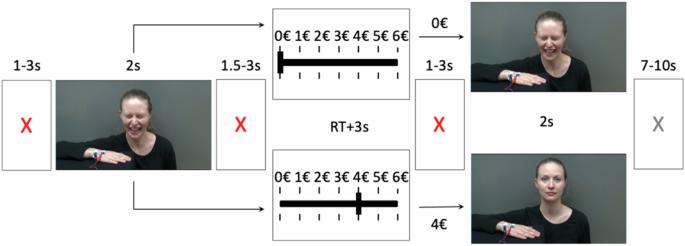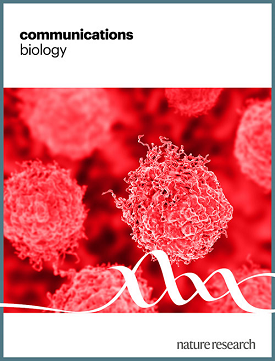内源性阿片受体系统在人脑中介导代价高昂的利他主义。
IF 5.2
1区 生物学
Q1 BIOLOGY
引用次数: 0
摘要
功能神经影像学研究表明,一个大规模的大脑网络会将他人的痛苦转化为观察者的代入表征,从而有可能调节帮助行为。然而,人们对替代疼痛和帮助行为的个体差异的神经分子基础知之甚少。我们研究了内源性μ-阿片受体(MOR)系统在利他主义成本帮助中的作用。我们使用[11C]卡芬太尼测量了MOR的密度。在另一个 fMRI 实验中,参与者可以捐钱来减轻同伴的电击疼痛。参与者普遍愿意提供帮助,在目睹他人疼痛时,杏仁核、前岛叶、前扣带回皮层(ACC)、纹状体、初级运动皮层、初级体感皮层和丘脑都出现了大脑活动。血流动力学反应与情绪回路中的MOR可用性呈负相关。然而,在帮助过程中,MOR的可用性与ACC和海马呈正相关。这些研究结果表明,内源性MOR系统能调节人脑中的利他主义。本文章由计算机程序翻译,如有差异,请以英文原文为准。

Endogenous opioid receptor system mediates costly altruism in the human brain
Functional neuroimaging studies suggest that a large-scale brain network transforms others’ pain into its vicarious representation in the observer, potentially modulating helping behavior. However, the neuromolecular basis of individual differences in vicarious pain and helping is poorly understood. We investigated the role of the endogenous μ-opioid receptor (MOR) system in altruistic costly helping. MOR density was measured using [11C]carfentanil. In a separate fMRI experiment, participants could donate money to reduce a confederate’s pain from electric shocks. Participants were generally willing to help, and brain activity was observed in amygdala, anterior insula, anterior cingulate cortex (ACC), striatum, primary motor cortex, primary somatosensory cortex and thalamus when witnessing others’ pain. Haemodynamic responses were negatively associated with MOR availability in emotion circuits. However, MOR availability positively associated with the ACC and hippocampus during helping. These findings suggest that the endogenous MOR system modulates altruism in the human brain. This PET-fMRI fusion study reveals that endogenous u-opioid receptor system modulates altruistic brain activity and its individual differences.
求助全文
通过发布文献求助,成功后即可免费获取论文全文。
去求助
来源期刊

Communications Biology
Medicine-Medicine (miscellaneous)
CiteScore
8.60
自引率
1.70%
发文量
1233
审稿时长
13 weeks
期刊介绍:
Communications Biology is an open access journal from Nature Research publishing high-quality research, reviews and commentary in all areas of the biological sciences. Research papers published by the journal represent significant advances bringing new biological insight to a specialized area of research.
 求助内容:
求助内容: 应助结果提醒方式:
应助结果提醒方式:


